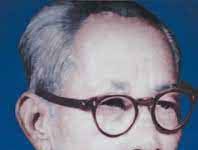Henry Vaughan-Brief Biography
Henry Vaughan
Henry Vaughan-Brief Biography
Henry Vaughan was one of the English poets of the seventeenth century, who are bracketed with the term ‘Metaphysical School of Poets’. He wrote poetry on a variety of themes; but his best poems dealt with mysticism, for which he may be called a mystic poet.
This mystic poet, Henry Vaughan, was born on the 17th of April 1621 at Newton St. Bridge in Wales. His chosen name was ‘Silurist’. The ‘Silurist’ is a name pertaining to a locality on the Welsh borders. The name ‘Silurist, was given to those people who, in olden times, lived in that locality. Henry Vaughan spent his early life with intimate love of the Welsh mountains and valleys, with their craggy rocks and rippling streams. Hence his childhood environment was poetic which made his mind inclined toward poetry. But it is a matter of sorrow that there is no available genuine biography of him, so much about his life cannot be known.
From the sources that have come down to us, it is known that he was born twin along with his brother named Thomas. Perhaps they, Vaughan and Thomas, lost their parents at an early age for which they had taken shelter under Matthew Herbert, the then rector of Langattock. He took care of nursing and schooling them. After completing their school education they- both Vaughan and Mathew- went to Jesus College, Oxford in 1633. Henry Vaughan wished to be a priest, for which he acquired sufficient skill in the Latin language. But somehow, he had to give up his wish later on and so left Oxford without taking a degree and then went to London with the hope to study law. But when he arrived in London, his wish changed and began to study medicine. After practising medicine for some years he took the profession of a physician in the region where he spent his childhood.
Though he was a physician, he had a mind inclining toward literature. From his childhood, he liked to spend his leisure time reading books, especially the poetry of Elizabethan poets and the poetry of John Donne. While he began his life as a physician, self-establishment came into his life and then he had to depend upon none. At that time, he took a pen in his hand and began to write verses. First, he began his poetic career by translating some Roman satires of Juvenal. His first book of poetry appeared in 1646 under a volume called ‘Poems, with the Tenth Satire of Juvenal Englished’. It was only a preliminary work of a bright genius. The poems of this volume dealt with the theme of love for Nature, but there was nothing in that volume that became the distinctive quality of his poems in the volume entitled ‘Silex Scintillans’ published in 1650. In that first volume of poetry, he showed a kinship with Johnson and Donne but there was little originality in that volume of poetry.
His second volume of poems appeared in 1650 under the little ‘Olor Iseanus’ which means ‘The Swan of the Usk’ (Usk is the name of a river in Wales). The theme of this volume of poetry is especially his reminiscences of friendship. This second volume of poetry was somewhat more developed in thought and style than that of his first volume.
As Henry Vaughan has not left any autobiography nor has anyone of his contemporary left any genuine biography, so much of his personal life is not known definitely; yet some of his poetry included in the volume Olor Iseanus makes us believe that during the fifties he took part in the civil war that happened between the Royal Forces and that of Cromwell.
Since the publication of his second book of poetry Olor Iseanus a turning point came in his life. After that, a painful sickness attacked him which nearly killed him. He himself thought to be at no great distance from death. As he was anticipating death, so he hoped to make an amendment for his miss-spent youth. And that is why his mind took a bend toward spiritual thought. By his time, he met the opportunity to read the works of George Herbert, a predecessor to him, who wrote distinctively great religious poems. He was greatly influenced by the poems of George Herbert. His third volume of poetry, by which he is known today, appeared in two parts between 1650 and 1655. The title of this volume of poetry was ‘Silex Scientillans’. It is his masterpiece, most poems of which are mystic. In this volume, Herbert’s influence is apparent both in thought and style. The poems belonging to this volume are characteristically different from that of his first two poetry books. ‘Spiritualism’ is the main theme of this volume of poetry, but his Spiritualism is mystic in appreciation. Some of his poems in this volume conformed to that of Herbert for which it is figuratively said that while he was writing the poems that belonged to this volume, he soaked his pen in Herbert’s verse.
His language is concrete, but the imageries are metaphysical and full of conceits and the mood and expression are dramatic like that of Herbert, but his language is less refined.
After publishing his masterpiece ‘Silex Scientillans’ (The Sparkling Flint), he published his fourth book of poems in 1674 after a long silence. To his credit, there are some prose works and some translations from Latin also but those are of little importance.
Here it is to say that though he is distinctively called a mystic or religious poet, yet some of his poems deal with his love for nature which is fundamental to him. His love for nature is Wordsworthian, for which he may be called a nature poet before Wordsworth.
He died in 1692. As a religious poet, his place is after his master, George Herbert only. 0 0 0
Henry Vaughan
N.B. The article ‘Henry Vaughan-Brief Biography’ originally belongs to the book ‘The World Writers-Brief Biographies‘ by Menonim Menonimus.
Henry Vaughan
Books of Composition by M. Menonimus:
- Advertisement Writing
- Amplification Writing
- Note Making
- Paragraph Writing
- Notice Writing
- Passage Comprehension
- The Art of Poster Writing
- The Art of Letter Writing
- Report Writing
- Story Writing
- Substance Writing
- School Essays Part-I
- School Essays Part-II
- School English Grammar Part-I
- School English Grammar Part-II..
Books of S. Story by M. Menonimus:
Related Search:











